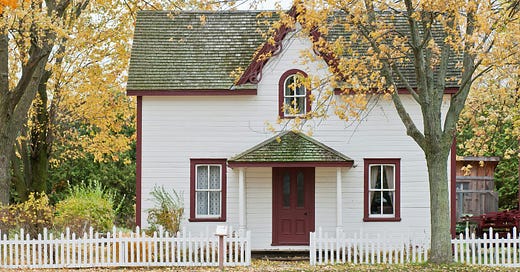Home has never just been a structure to me. It’s more than timber and tile, more than an address or a mortgage. It’s memory, mostly. A shape you feel more than see. A place you carry inside your body long after you’ve left the actual rooms.
I’ve been thinking a lot lately about what makes a home. Not just the physical house, but the feeling of it. The way certain spaces hold us, or fail to. The way the scent of garlic on my hands can send me tumbling back to a kitchen I haven’t stood in for decades. Or how the sound of a creaky stair can pull grief from my chest faster than any photograph ever could. Home, for me, has always lived in the small things—cups left drying on the rack, light filtering through old curtains, the particular quiet of a late afternoon.
But home isn’t always tender. Sometimes it’s the place where the hard things happened. The echo of slammed doors. Silence that felt less like peace and more like punishment. A hallway I once walked down, afraid. And yet, even in those moments, there was still the ache of wanting it to be something else. Some part of me still reaching for comfort, even when it wasn’t offered. That’s the paradox of home—it can be haven and hurt at once.
Somewhere along the way, I started thinking about home less as a building and more as what I call the architecture of belonging. Not blueprints and beams, but the emotional scaffolding that holds us up. The people who say, You can sit here, and mean it. The spaces where we don’t have to explain ourselves, where our weirdness or our wounds don’t disqualify us. It’s not always the family you were born into; sometimes it’s the family you build, slowly, like a house you never thought you’d have. Belonging isn’t about being the same—it’s about being safe in your difference. That’s a kind of home, too.
Literature gave me language for that long before I could name it myself. I remember reading Toni Morrison’s Beloved, how 124 Bluestone Road was both a sanctuary and a place haunted by what couldn’t be buried. I felt that. Not the specifics of that story, but the emotional truth of it. How a house can hold everything that’s unresolved. How it can be a battleground, a balm, a wound that never fully closes.
And then there’s the kind of home you miss before you even leave it. The kind that gets reimagined once it’s gone. That’s something I see so vividly in the work of writers like Ocean Vuong and Jhumpa Lahiri. Their words pulse with the longing of diasporic experience—a kind of homesickness not just for a country, but for a version of self that feels distant, half-formed, or maybe split in two. I don’t come from a (recent) immigrant background, but I understand what it means to feel like home is always a little out of reach. To live with that gap between belonging and estrangement.
Sometimes, I think language itself is the home I’ve been trying to build all along. The voice I grew up with—my father’s, warm and certain—feels like the root of every sentence I write. And when I lost his voice, I found myself writing more, trying to rebuild something with syllables. Writing has become a kind of shelter for me. Not to hide in, but to rest in. To sort through the rooms of my past and figure out which ones I still want to carry with me.
I’m learning, slowly, that home doesn’t have to be a fixed place. It can be a moment. A gesture. A meal. A memory you return to because it reminds you who you are. A chipped teacup that once belonged to your grandmother. The act of chopping onions the way your father taught you. Home lives in those details.
And yes, sometimes home is what we make in the aftermath. After the fire, after the grief, after the leaving. Maybe we build it in the quiet companionship of a friend. In the rhythm of morning routines. In the poems we write when we don’t know what else to do with our hearts.
What I know now is that home doesn’t have to be perfect to be real. It doesn’t have to be whole to matter. It just has to hold enough of you that you can recognize yourself in it. And if it doesn’t? Then we write our way back. We build with what we have—memory, language, love—and make something sturdy enough to come back to.
Love,
Patti






Powerful lines: “I started thinking about home less as a building and more as what I call the architecture of belonging. Not blueprints and beams, but the emotional scaffolding that holds us up. The people who say, You can sit here, and mean it. The spaces where we don’t have to explain ourselves, where our weirdness or our wounds don’t disqualify us.” Thank you, Patti.
I don't think I've ever identified with a piece of writing more.
Thank for putting words to a feeling I have always held, but never been able to put my own words to. ❤️🔥